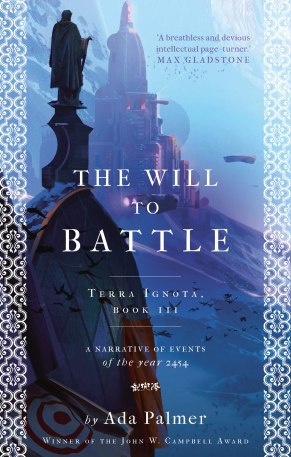 There are benefits to blogging: being part of a conversation, just as Ada Palmer with her writing wants to be part of the conversation. When I was on the brink of finishing Perhaps The Stars, Agnus Burke – from the excellent Utopia in the Works, a blog focused on rereading Kim Stanley Robinson – commented on my review of The Will to Battle, the previous book in Palmer’s Terra Ignota series. That comment helped me tremendously in pinpointing exactly what I wanted to say in this final review.
There are benefits to blogging: being part of a conversation, just as Ada Palmer with her writing wants to be part of the conversation. When I was on the brink of finishing Perhaps The Stars, Agnus Burke – from the excellent Utopia in the Works, a blog focused on rereading Kim Stanley Robinson – commented on my review of The Will to Battle, the previous book in Palmer’s Terra Ignota series. That comment helped me tremendously in pinpointing exactly what I wanted to say in this final review.
Before I get to that, a short recap for those of you who haven’t read the previous reviews. Perhaps the Stars is the fourth and final book of Terra Ignota, a series that started with Too Like the Lightening, a book that blew me away and that I rank among the best books I’ve read – in my review I try to explain why.
Book 2 and 3 were excellent as well, but not fully on the level of Palmer’s debut. And so I wrote lengthy analyses, trying to spell out my feelings. 8,600 words on Seven Surrenders, most notably on the series’ metaphysics – tied with Mycroft’s status as a narrator, its seemingly essentialist outlook, the case study of utilitarian ethics, the nature of J.E.D.D. and the books’ politics, intrigues and world building. And 6,400 words on The Will to Battle, on the epistemic nature of the text & its relation to the metaphysics of Palmer’s future world, and about J.E.D.D.’s problematic motivation for his involvement in the coming war – linked to utilitarianism and the trolley problem.
These reviews are a testimony of an ongoing reading process, and I wouldn’t have written certain parts with what I know in hindsight. I don’t think that’s a problem, as they serve as a mapping of sorts to the problems Palmer presents her readers – she has been vocal about one of her goals: getting people to think and engage with these books. So I won’t alter these reviews retroactively, that would defy their pondering, searching nature – except that I will add one remark to my review of Seven Surrenders, out of intellectual fairness.
Now that I’ve finished the full series, this final review – 5,500 words – will also serve as my thoughts on the full series, and for those thoughts I’ll start with Burke’s comment. I’ll also discuss some other stuff that wasn’t fully to my taste this time, and I’ll end with a few short discussions: on free will, on J.E.D.D’s. nature & the fallacy of fiction being a real world guide, on J.E.D.D.’s trolley problem motivation, on the trolley problem itself & on a few of the series’ gender aspects.
In short, I think Palmer did an amazing job – an insane amount of work – crafting her narrative construction, providing tons of great ideas and sets and characters and twists and genuine moments of awe – but, and this may seem paradoxical for a novel full of really insightful stuff, I think the main philosophical foundation of the four Terra Ignota books is uninteresting and unproductive. How’s that for a cliffhanger?


 Normally I read more than 15 other books between installments of a series, but as I was so hooked by Too Like the Lightning, Ada Palmer’s debut, I decided to read book 2 of Terra Ignota quickly.
Normally I read more than 15 other books between installments of a series, but as I was so hooked by Too Like the Lightning, Ada Palmer’s debut, I decided to read book 2 of Terra Ignota quickly.



